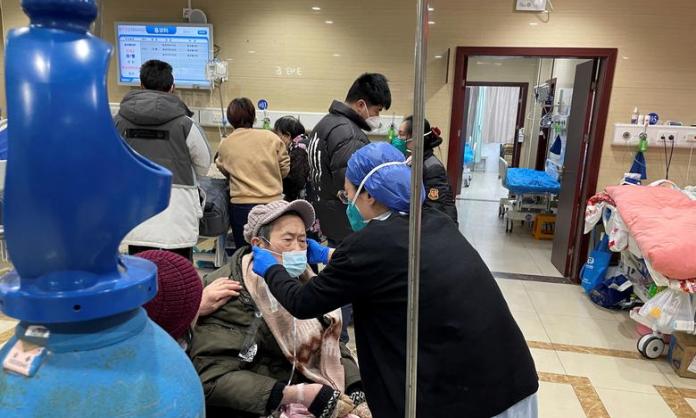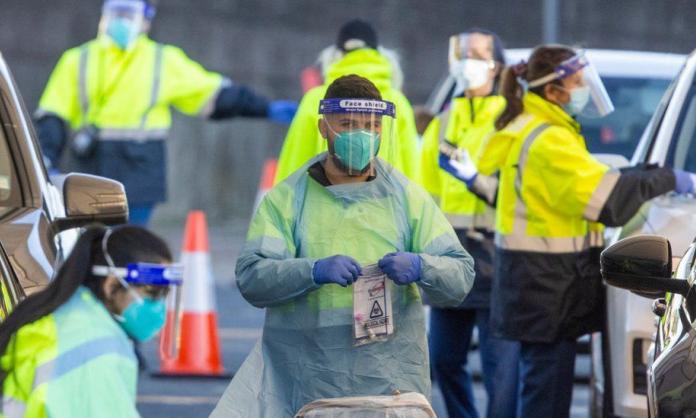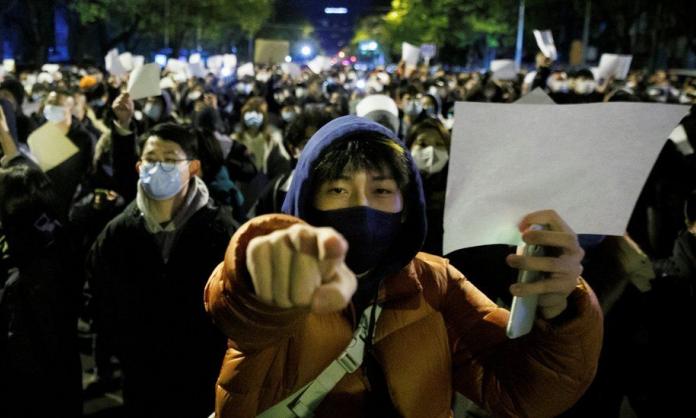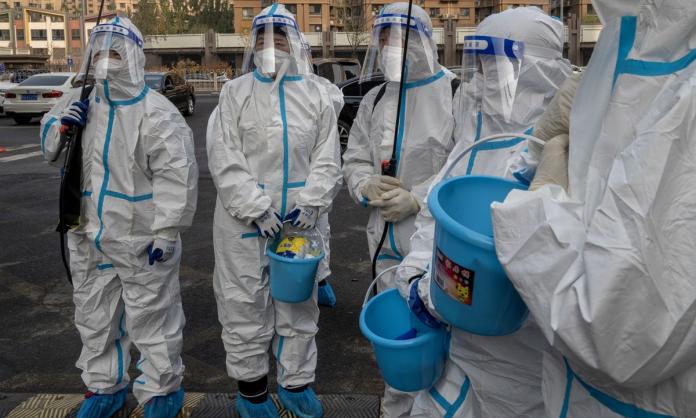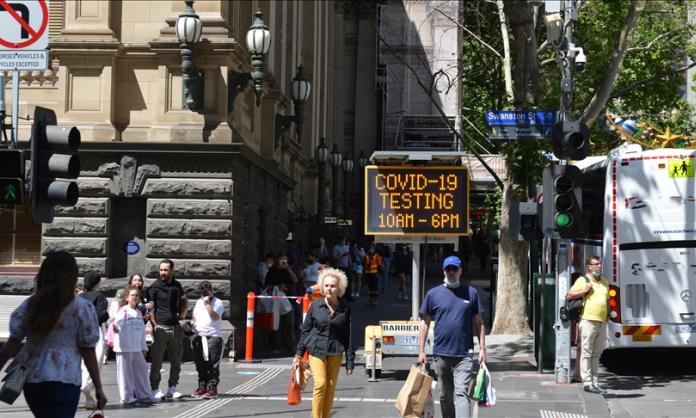There can be no overstating the significance of this horrific crisis for humanity. The death toll is escalating out of control. City after city across the world is being locked down. Industry after industry is shutting up shop. Workers face mass unemployment and a savage assault on wages and their living standards as the bosses and their governments seek to shore up their profit margins by imposing the cost of the crisis on the mass of the population.
And the crisis is set to get much, much worse. So far, the epicentres of the crisis have been China and Italy. For all the terrible limitations of their health systems, they are still better than what exists in India, Indonesia or Africa. If the virus is not contained soon (which is extremely unlikely), we face the prospect of tens of millions of people dying in this apocalypse. The mass graves in Iran are but a warning of what is to come.
This is not some natural disaster. Capitalism is to blame for this horrific crisis – whether it is the reckless expansion of capitalist agriculture, the refusal to invest in scientific research for virus control measures, the relentless running-down and privatisation of public health systems, censorship and lack of public openness and so on. All of this is compounded by the fact that, when it has come to measures to control the viral outbreak, governments everywhere have prioritised stabilising the capitalist system and protecting the profits and power of big business above implementing effective, but expensive, public health measures.
Intersecting and intertwining with the health crisis is the rapidly developing global economic crisis, which seems set to usher in a recession that will be far deeper and more widespread than the 2008-09 global financial crisis (GFC). Goldman Sachs is forecasting a 24 percent contraction of the US economy in the second quarter of this year. The pandemic sparked the economic collapse, but it was a crisis waiting to happen. The recovery from the GFC was always tepid and fragile.
Profit rates never recovered sufficiently in the aftermath of the GFC to provide the basis for a sustained boom in the core sections of the economy. Consequently, growth rates have been mediocre worldwide. To shore up the weak economy, governments and central banks have over the last decade slashed interest rates, flooded the system with liquidity and sharply run-up government debt.
But with the capitalists having little confidence that they could make adequate returns on productive investment, all this money sloshing around has primarily gone into speculative, unproductive investments in a financial sector that has expanded enormously. A plethora of so-called zombie companies that are massively in debt and produce nothing have emerged – they now face collapse as the crisis deepens.
This is a very different crisis, however, to the GFC. The GFC started in the financial sector – especially around all sorts of high-risk loans – and then spread to the productive core of the economy. This time, the crisis has started in the productive core of the economy. Even before the coronavirus seriously impacted the economy, production was falling in several areas. For example, the Australian manufacturing sector had experienced its sharpest fall in production in 20 years.
Then, with the virus hitting, production was shut down in much of China. The impact rapidly flowed through to the airline industry, tourism, hotels, catering, oil, universities, shipping and so on. In Italy and much of Europe and the US, car plants and other core manufacturing industries are shutting down. Australian mineral exports are hit as industries overseas shut down. This supply-side crisis in turn hit consumer demand as people’s confidence to spend fell away; they lost their jobs, had their working hours and wages cut. Shops closed. The crisis in the productive core of the economy inevitably impacted the share markets and the financial sector, which in turn further deepened the economic spiral.
Further inflaming the situation has been imperial tensions and nationalist protectionist measures as governments try to wall off their own economies from the crisis with beggar thy neighbour policies. The Saudi state is flooding the world with ultra-cheap oil in a deliberate attempt to send its rivals in the US – the fracking companies that can’t extract their oil as cheaply as the Saudis’ – to the wall. It is the old capitalist motto: a crisis for some is an opportunity for others.
Governments are resorting to massive emergency measures and central banks have slashed interest rates to the bone and are resorting to quantitative easing in a desperate attempt to hold things together. However, the expansion of credit is unlikely to have much of a positive impact. Even with incredibly cheap loans available, capitalists are unlikely to invest in productive assets when they don’t see the possibility of a profitable rate of return.
The extra government spending may soften the blow a bit. But it will not re-open car factories, get planes flying, fill hotels with tourists or get more Chinese students to come to Australia any time soon. For core industries such as airlines to survive, they are going to have to be nationalised or taken under some form of state control.
Last time around, China was much less impacted by the crisis and played an important role in pulling much of the world economy out of the slump. This was particularly important for Australia. This time, the Chinese economy, which was already slowing before the coronavirus hit, has contracted for the first time in decades. Because China is still essentially a state capitalist economy, it conceivably may be able to cope with the crisis better than its Western rivals. So its position compared to US imperialism may possibly be strengthened by the crisis.
But the Chinese economy has been badly hurt by and can be hurt by further outbreaks of the virus. In any case, the Chinese economy is not strong enough to pull the whole world economy out of this slump.
This will have a significant impact on the Australian economy, which is already being very badly hit by the pandemic crisis. Furthermore, given the level of government debt, the Morrison government is less able than at the time of the GFC to deliver a sufficiently huge bailout package to salvage things.
We are in a totally new, rapidly changing and incredibly volatile situation. We can’t know how savage this recession will be and how exactly governments will respond. Moreover, the scale of the economic crisis is highly dependent on how long lasting and devastating is the pandemic.
Will be it kill a few million or tens of millions? Will it last six months or 18 months? How many rounds of it will there be? China seems to have contained it in Wuhan, but will it erupt in other Chinese cities as Chinese travellers bring it back from abroad?
What we do know is that we are in for a period of tremendous turmoil and upheaval in world capitalism and, flowing from that, in popular consciousness. Unless the virus is rapidly contained this pandemic and allied economic crisis are set to radically transform world politics in all sorts of unpredictable ways.
There are innumerable “unknown unknowns”. But what we do know is that bosses and their governments will go on the offensive to take advantage of the turmoil and disorientation to savage workers’ rights, working conditions and ability to organise. Workers’ lives are going to be tremendously shaken up. Many will lose their jobs or have their pay cut. Their safety will be threatened and their friends, partners, relatives and work mates will be hospitalised. Many will die. This will result in tremendous grief, disorientation and despair – but also, potentially, incredible bitterness and disillusionment with the whole political set-up.
We don’t know how things will develop on our side over the next few very difficult months. For a short or more prolonged period, workers may accept the measures governments take to deal with the pandemic as they see no alternative. But already in Italy, Britain and various other countries we have seen some outbreaks of struggle. Even in the US, wildcat strikes forced the closure of car factories.
But mass consciousness can shift dramatically once it becomes clear that the health system is a disaster zone; that lives are being needlessly lost at a massive rate; that governments are prioritising bailing out companies while pensioners, poor people and workers are dying in droves; and that jobs are being slashed and wages cut while bosses are profiteering. Potentially, the ground will be laid for social explosions.
It will be difficult for those workers atomised in their homes after their workplaces shut down to organise a collective fightback. But that won’t last indefinitely. And whole sections of workers will be still in work – health workers, supermarket workers, transport workers, food workers, electricity workers, waterfront workers and so on. The industrial power of these workers will be massively increased by the pandemic. As well, at some point production will resume in several areas and many, though not all workers, will go back to work.
That will not automatically lead to a fightback. Without a determined socialist leadership, it might take many months or a few years for concerted resistance to emerge. We have no crystal ball. However, history is speeding up tremendously as crisis piles upon crisis.
What we do know is that the GFC led to massive struggles in Greece and the rise of Syriza, the occupation of the squares in Spain and Occupy Wall Street in the US. And then the wave of revolutions that swept North Africa and the Middle East in the Arab Spring.
Over the last year, there was an important further upsurge in struggle from Sudan to Lebanon to Iraq to Hong Kong to Chile and numerous other countries. The economic, social and ideological turmoil this time round is set to be much more profound than after the GFC. People’s lives will be ripped apart by a terrifying health crisis and a collapse in living standards. Add on to that the unfolding climate crisis that has led to a significant rise in struggle over the last year.
The legitimacy of capitalism is going to be severely challenged at every level. There is the potential for tremendous upheavals and a further wave of revolutions. Growing imperial tensions and localised wars will compound the instability. The pandemic combined with the economic crisis has the potential to tear apart the whole social fabric of poorer countries. The health systems of Nigeria or Pakistan or Bangladesh or Ethiopia will simply not cope with the virus. In India, an estimated 20 million died in the 1918-20 so-called Spanish Flu. We cannot rule out similar horrors this time round.
People dying in large numbers in the streets and widespread food shortages in much of Africa and Asia can lead to mass rioting and tumultuous protests. Whole sections of the state apparatus can be savaged by the crisis, soldiers can die in large numbers, desert or mutiny.
Australia was less impacted by the GFC than most countries. This crisis will come as an unprecedented shock to most workers, especially young people. How this will play out politically over the next few years is very much an open question. The working-class movement has long been on the back foot, union membership has sharply declined and there is not a strong left to organise struggle.
But who can predict how the masses will react to such an earth-shattering crisis? Consciousness can be rapidly transformed. Workers and students can rapidly oscillate between disorientation and atomised despair to spontaneous outbursts of rage or look to the far right for solutions. In other countries, such as France or Chile where we have seen major struggles in the recent period, the crisis can inflame the situation.
Overall, while it may be incredibly uneven from country to country, we can expect to see at some point – maybe in the next year or two, maybe in five years – a further upsurge of tremendous struggle that sweeps whole sections of the world. The poorer countries in Africa and Asia will be particularly susceptible to revolutionary upheavals.
That does not of course mean that these revolutions will be victorious. The lack of a strong revolutionary socialist movement tragically means that the revolts will most likely go down to defeat. It will take many years of bitter struggles, defeats and partial victories for a new, powerful revolutionary left to cohere and ideologically clarify.
Moreover, the crisis will not just open opportunities for the left. Far right forces will attempt to exploit the turmoil to their advantage, blaming foreigners, migrants and refugees for collapsing living standards. Governments will resort to savage authoritarian measures to contain resistance. Reformists, liberals and union leaders will do whatever they can to derail a concerted fightback. All of this will throw up enormous challenges and opportunities for socialists in the coming years.
Nothing is guaranteed in politics. But socialists have a responsibility to give it our all and not succumb to all the difficulties of organising in this unprecedented period. In the short term, socialists have to focus on making the core propaganda arguments sheeting home the blame for this crisis on the capitalist system and arguing forcefully that there is no point trying to patch up a horrific world order that is slaughtering millions of people. It has to be overthrown.
Socialists need to try to cohere people around them on that basis and help prepare the ground for future opportunities as the terrain sharply and unpredictably changes. At the same time, in this volatile and rapidly changing situation, revolutionaries need to raise concrete demands to relate to particular atrocities and outbursts of anger and take new initiatives to relate to the specific struggles that break out.
At times, revolutionaries will take the initiative ourselves to try to build resistance. We in Socialist Alternative have already been doing so on a number of fronts.
This means revolutionaries will have to be highly flexible and prepared to experiment and make mistakes as the political terrain shifts rapidly from day to day – from moments of terrible despair and sadness, to upsurges of racism, to outbursts of resistance and heroic examples of self-sacrifice by workers in the front line, such as health workers.
To do all this and survive politically through this challenging, rapidly changing political situation, and potentially long periods of social isolation, a premium must be placed on raising our level of political commitment and understanding; continuing to engage in lively discussion and debate and finding whatever ways we can to relate outwards to win others to a revolutionary standpoint.
As revolutionaries we have to withstand whatever capitalism throws at us, deepen our commitment to eradicating this vile system and land whatever counterblows we can.







